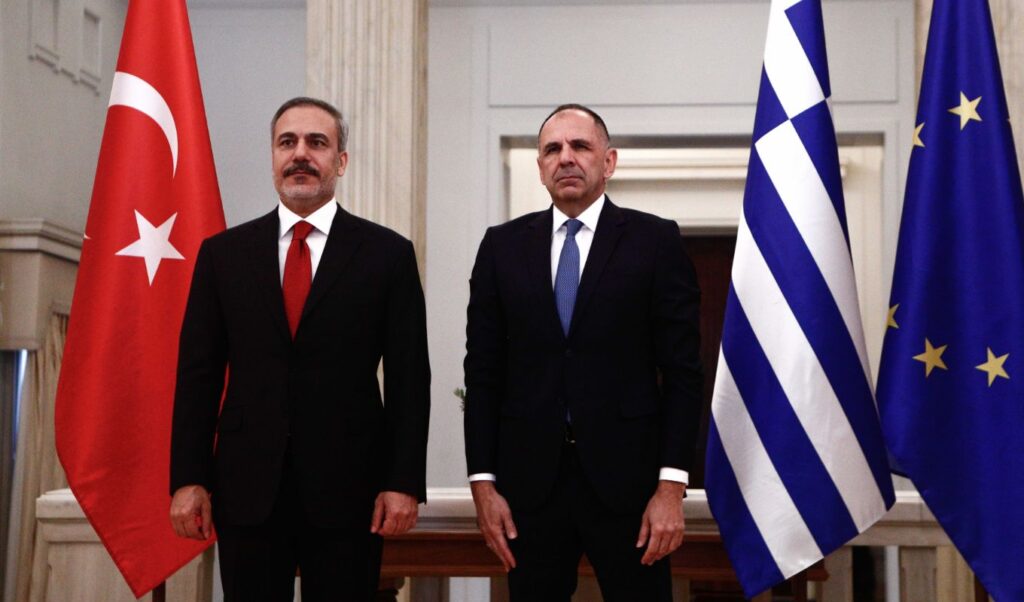At the EU Foreign Ministers Council meeting today in Luxembourg, the first meeting in some time between Greek Foreign Minister Giorgos Gerapetritis and his Turkish counterpart Hakan Fidan will take place. This meeting comes after a period of tension in Greek-Turkish relations caused by the conditions Athens has set for Turkey’s participation in the European defense financial instrument SAFE, the intention to complete the electrical interconnection (GSI) between Greece and Cyprus, and the activation of Chevron’s presence south of Crete.
The Gerapetritis-Fidan meeting also comes one day after an exchange of strong statements between the two ministers regarding the SAFE program and the issue of Greece’s territorial waters extension to 12 nautical miles. The head of Turkish diplomacy appeared to resort to “bargaining” for the determination of the EEZ, while maintaining that the issue can be resolved. As he said, “I don’t accept 12 miles, you don’t accept 6 miles. So we stand at certain points, exploratory talks have taken place in the past, certain distances have been covered. The Aegean issue is not an unsolvable problem. As long as there is will, this problem can be solved.”
SAFE program on the agenda for Gerapetritis-Fidan and the Foreign Ministers Council
In today’s Foreign Ministers Council session, to which Turkey has been invited, as well as in the private Gerapetritis-Fidan meeting, it is considered certain that Turkey’s participation in the SAFE program will be discussed. Greece is expected to find itself in a particularly pressured situation due to the decision by the EU’s most powerful states, such as France, Italy, and Germany, to support Turkey’s inclusion in the program, whose participation they consider extremely important for Europe’s defense strengthening.
Just the day before yesterday, German Foreign Minister Johann Wadephul from Ankara supported Turkey’s participation in SAFE, also highlighting the necessity of German-Turkish cooperation in the defense industry sector. Supporting the German-Turkish defense cooperation is also the visit of German Chancellor Friedrich Merz to Turkey in a few weeks to meet with Turkish President Recep Tayyip Erdogan.
However, a catalyst in Greek-Turkish relations is expected to be Athens’ proposal for a meeting of the five Mediterranean coastal countries (Greece, Turkey, Egypt, Libya, Cyprus) in the coming period to discuss pending issues, including the thorny issue of maritime zone delimitation. Despite Turkey’s (expected) reactions to Cyprus’ participation and our country’s invocation of the Law of the Sea (a treaty that Turkey rejects), the two countries appear to be taking steps toward dialogue. Washington’s active interest in resolving pending issues between Mediterranean countries also plays an important role, in order to proceed unhindered with the implementation of energy projects that American energy giants like Chevron and ExxonMobil have expressed interest in.
Avramopoulos to parapolitika.gr: Mitsotakis’ proposal for regional dialogue forum can open a new chapter of understanding and stability
It’s worth noting that Greece’s initiative appears to be gaining consensus from all political actors in our country. Indicative is the statement by former Foreign Minister Dimitris Avramopoulos to parapolitika.gr: “The Prime Minister’s proposal for convening a regional dialogue forum can open a new chapter of understanding and stability. Keys to success are Cyprus’ reunification and peace in the Middle East. Greece, with its historical and European prestige, must lead as a force of initiative and cooperation,” the former Foreign Minister argues.
The issue of dialogue between the five Mediterranean coastal countries is expected to occupy Thursday’s Summit as well, within the framework of discussions on Europe’s common defense policy.




